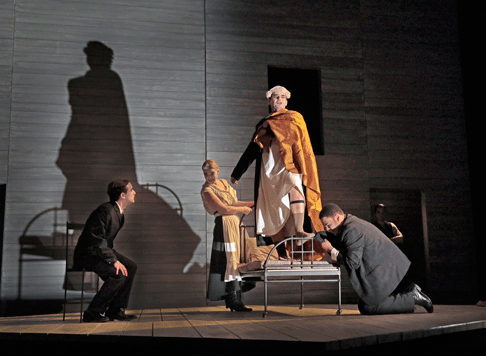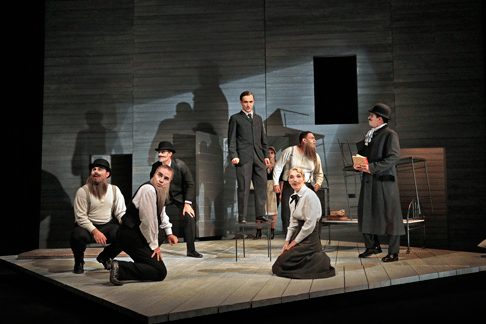![Robert Mellon, Theo Hoffman, Joshua Blue, Susannah Biller, and Keith Phares [Photo by Ken Howard]](http://www.operatoday.com/TRIAL_0591a.png)
25 Jun 2017
On Trial in Saint Louis
That Opera Theatre of Saint Louis fearlessly embraces the cutting edge is once again evidenced by their compelling American premiere of The Trial.
English Touring Opera are delighted to announce a season of lyric monodramas to tour nationally from October to December. The season features music for solo singer and piano by Argento, Britten, Tippett and Shostakovich with a bold and inventive approach to making opera during social distancing.
This tenth of ten Live from London concerts was in fact a recorded live performance from California. It was no less enjoyable for that, and it was also uplifting to learn that this wasn’t in fact the ‘last’ LfL event that we will be able to enjoy, courtesy of VOCES8 and their fellow vocal ensembles (more below …).
Ever since Wigmore Hall announced their superb series of autumn concerts, all streamed live and available free of charge, I’d been looking forward to this song recital by Ian Bostridge and Imogen Cooper.
Although Stile Antico’s programme article for their Live from London recital introduced their selection from the many treasures of the English Renaissance in the context of the theological debates and upheavals of the Tudor and Elizabethan years, their performance was more evocative of private chamber music than of public liturgy.
Evidently, face masks don’t stifle appreciative “Bravo!”s. And, reducing audience numbers doesn’t lower the volume of such acclamations. For, the audience at Wigmore Hall gave soprano Elizabeth Llewellyn and pianist Simon Lepper a greatly deserved warm reception and hearty response following this lunchtime recital of late-Romantic song.
For this week’s Live from London vocal recital we moved from the home of VOCES8, St Anne and St Agnes in the City of London, to Kings Place, where The Sixteen - who have been associate artists at the venue for some time - presented a programme of music and words bound together by the theme of ‘reflection’.
'Such is your divine Disposation that both you excellently understand, and royally entertaine the Exercise of Musicke.’
‘And there was war in heaven: Michael and his angels fought against the dragon; and the dragon fought and his angels, And prevailed not; neither was their place found any more in heaven … that old serpent … Satan, which deceiveth the whole world: he was cast out into the earth, and his angels were cast out with him.’
There was never any doubt that the fifth of the twelve Met Stars Live in Concert broadcasts was going to be a palpably intense and vivid event, as well as a musically stunning and theatrically enervating experience.
‘Love’ was the theme for this Live from London performance by Apollo5. Given the complexity and diversity of that human emotion, and Apollo5’s reputation for versatility and diverse repertoire, ranging from Renaissance choral music to jazz, from contemporary classical works to popular song, it was no surprise that their programme spanned 500 years and several musical styles.
The Academy of St Martin in the Fields have titled their autumn series of eight concerts - which are taking place at 5pm and 7.30pm on two Saturdays each month at their home venue in Trafalgar Square, and being filmed for streaming the following Thursday - ‘re:connect’.
The London Symphony Orchestra opened their Autumn 2020 season with a homage to Oliver Knussen, who died at the age of 66 in July 2018. The programme traced a national musical lineage through the twentieth century, from Britten to Knussen, on to Mark-Anthony Turnage, and entwining the LSO and Rattle too.
With the Live from London digital vocal festival entering the second half of the series, the festival’s host, VOCES8, returned to their home at St Annes and St Agnes in the City of London to present a sequence of ‘Choral Dances’ - vocal music inspired by dance, embracing diverse genres from the Renaissance madrigal to swing jazz.
Just a few unison string wriggles from the opening of Mozart’s overture to Le nozze di Figaro are enough to make any opera-lover perch on the edge of their seat, in excited anticipation of the drama in music to come, so there could be no other curtain-raiser for this Gala Concert at the Royal Opera House, the latest instalment from ‘their House’ to ‘our houses’.
"Before the ending of the day, creator of all things, we pray that, with your accustomed mercy, you may watch over us."
The doors at The Metropolitan Opera will not open to live audiences until 2021 at the earliest, and the likelihood of normal operatic life resuming in cities around the world looks but a distant dream at present. But, while we may not be invited from our homes into the opera house for some time yet, with its free daily screenings of past productions and its pay-per-view Met Stars Live in Concert series, the Met continues to bring opera into our homes.
Music-making at this year’s Grange Festival Opera may have fallen silent in June and July, but the country house and extensive grounds of The Grange provided an ideal setting for a weekend of twelve specially conceived ‘promenade’ performances encompassing music and dance.
There’s a “slide of harmony” and “all the bones leave your body at that moment and you collapse to the floor, it’s so extraordinary.”
“Music for a while, shall all your cares beguile.”
The hum of bees rising from myriad scented blooms; gentle strains of birdsong; the cheerful chatter of picnickers beside a still lake; decorous thwacks of leather on willow; song and music floating through the warm evening air.
![Robert Mellon, Theo Hoffman, Joshua Blue, Susannah Biller, and Keith Phares [Photo by Ken Howard]](http://www.operatoday.com/TRIAL_0591a.png)
That Opera Theatre of Saint Louis fearlessly embraces the cutting edge is once again evidenced by their compelling American premiere of The Trial.
This lean, mean, darkly humorous lyric piece is based on Franz Kafka’s story as adapted by librettist Christopher Hampton and composed by the prolific minimalist Philip Glass. Its disturbing relevance proves at once contemporary and cautionary.
Josef K., you see, is being arrested for an unspecified crime. He is under constant observation, his every move is questioned; his every statement parried or parsed. Innuendo and supposition substitute for evidence. Swirling around him is an ever-morphing ensemble of quirky, murky grotesques.
The anchor of the production is the physically slight, vocally towering performance of Theo Hoffman as Josef K. Seldom off stage, Mr. Hoffman deployed his ringing baritone to tremendous effect, mining every nuance out of a wide-ranging, emotionally draining characterization. His beautifully internalized acting made K a wholly engaging personality, a sympathetic patsy whose victimization was first cruelly comical, then horrifyingly tragic. His beautifully modulated singing was even throughout all registers, and was as notable for its powerful bursts of indignation as for its introspective, whimpering cries of disbelief. Theo has created as thrillingly definitive a rendition of this central character as is likely possible.
 Theo Hoffman, Susannah Biller, Keith Phares, and Joshua Blue
Theo Hoffman, Susannah Biller, Keith Phares, and Joshua Blue
And OTSL, being such a reliably renowned company, has surrounded their riveting star with an equally accomplished cast of supporting players, all of whom assume multiple roles with equal success.
Joshua Blue and Robert Mellon set the bar very high with their initial appearances as the arresting officers (Guards) with secure vocalizing, theatrical energy, and uninhibited comic business. Both had notable success in their “name” roles as Block (Mr. Blue) and the Priest (Mr. Mellon), the latter having a penultimate scene with K that drew powerful, unrestrained vocalizing from Mr. Mellon.
Matthew Lau’s weighty bass brought a smarmy gravitas to the Inspector, and a sinuous presence to Uncle Albert. Sofia Selowsky was such a free-wheeling, sexed-up Washerwoman, her stage antics almost upstaged her beautifully free, rich-toned mezzo. She also shone in her doubling as Frau Brubach and Woman. Soprano Susannah Biller offered silvery singing and detailed acting in the dual roles of . Fräulein Bürstner and Leni. The latter especially highlighted Ms. Biller’s gifts, allowing not only for awesome vocal flights but also gripping acting.
Keith Phares seemed to be having a field day with the triple challenges of the Magistrate, Assistant, and the bed-ridden (or is he?) Lawyer Huld. Mr. Phares’ fluid baritone is warm and ingratiating, and it has adopted a pleasing patina over the years. Brenton Ryan was a solid Berthold, and a willing Flogger (don’t ask), but his bright tenor and unrestrained acting chops really packed a wallop as the eccentric painter Titorelli.
 The cast of The Trial
The cast of The Trial
The Expressionistic set and costume designs by Simon Banham were notable for their smart starkness and highly effective in their blunt simplicity. A square platform was placed like a baseball diamond right up to the edge of the pit. It was backed by a floor-to-ceiling wall, both constructed with rustic, light gray wooden planking. The wall has a high window, a couple of doorframes, and double barn doors dead center that open and close to reveal changeable insets.
Late in the show, the wall parts and tracks off stage, leaving only the island of the platform, almost “floating” against the all-black background. Costumes were mostly black and white, and clearly communicated each character. The brilliant lighting design was one of Christopher Akerlind’s best, with its intentionally limited use of color, and its incorporation of cock-eyed, disorienting trapezoidal projections. The simple combination of carefully selected furniture and its seamless incorporation into the staging were admirable.
Director Michael McCarthy has brilliantly harnessed all this talent into a tightly focused, beautifully controlled whole. He has seized on the Big Brother concept. When actors are not directly involved in a scene, they are observing, hovering, menacing in an intriguing variety of stage pictures. Mr. McCarthy has created an awesome ensemble with these singers, able to turn on a dime, serving as a solo character one minute, observer another, and set changer yet another, before plunging back into the action as a totally different character. This high level of ensemble playing simply does not happen without a skilled director of the caliber of Michael McCarthy.
And speaking of a “high caliber of ensemble playing” (and I was), Conductor Carolyn Kuan worked equal magic in the pit. Maestra Kuan elicited the all-important, pulsating, rhythmically precise orchestral execution, to be sure. She also drew an abundance of color from her players and singers alike, achieving a varied palette of satisfying musical effects. In a score that has a fair share of twitchy, angular components, Ms. Kuan managed to cue each and every entrance with an incredible accuracy.
The Trial may not send you out of the theatre humming a tune, but owing to this illuminating production, it cannot help but leave you challenged and changed.
James Sohre
Cast and production information:
Josef K.: Theo Hoffman; Franz (Guard 1)/Block: Joshua Blue; Willem (Guard 2)/Court Usher/Clerk of Court/Priest: Robert Mellon; The Inspector/Uncle Albert: Matthew Lau; Frau Grubach/Washerwoman/Woman: Sofia Selowsky; Fräulein Bürstner/Leni: Susannah Biller; Magistrate/Assistant/Lawyer Huld: Keith Phares; Berthold, a Student/Flogger/Titorelli: Brenton Ryan; Conductor: Carolyn Kuan; Director: Michael McCarthy; Set and Costume Design: Simon Banham; Lighting Design: Christopher Akerlind; Wig and Make-up Design: Tom Watson